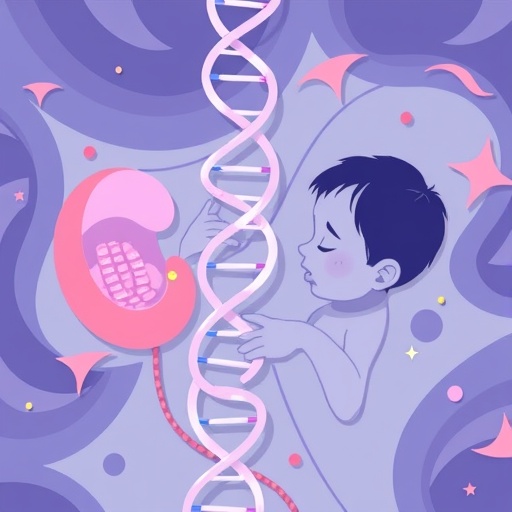Recent research published in Biology of Sex Differences investigates the fascinating interplay between placental mitochondrial DNA mutations, maternal stress, and the emotional well-being of infants. The study, conducted by a team led by de Pins et al., employs a multidisciplinary approach to uncover new insights about how genetic factors from the mother may interact with psychological and environmental variables, such as stress and infant sex, to influence infant behavior and temperament. This groundbreaking work not only sheds light on the biological underpinnings of infant negative affectivity but also raises important questions about maternal health and its implications for child development.
The primary focus of the study is the role of mitochondrial DNA within the placenta. Mitochondrial DNA, which is inherited exclusively from the mother, could serve as a crucial factor in determining how a child responds emotionally to various stimuli. This is particularly significant given the growing body of evidence suggesting that genetic predispositions can heavily influence psychological traits. In this study, the authors explore how specific mutations in mitochondrial DNA may correlate with increased levels of negative emotions in infants, a crucial aspect for understanding emotional development.
In parallel, researchers have noted that maternal lifetime stress significantly affects not only the mother’s health but also the fetal environment during pregnancy. Stress experienced by a pregnant woman can lead to changes in hormonal, neurological, and even genetic factors. This interplay between a mother’s psychological state and the child’s emotional response brings into question traditional views that treat genetics and environment as separate entities. By examining how stress modifies the effects of mitochondrial mutations, the study aims to bridge this gap in understanding the complex tapestry of child development.
One of the standout features of this research is its emphasis on infant sex as a modifying factor in the relationship between maternal stress and mitochondrial mutations. Studies suggest that boys and girls may exhibit differing responses to environmental challenges due to biological distinctions. This research highlights the need to consider sex as a critical variable in studies on emotional development. By investigating how male and female infants react differently to the genetic background set by mitochondrial DNA alongside their mother’s stress levels, the study opens a new avenue for understanding gender differences in emotional and behavioral outcomes.
The findings of this research may have significant implications for healthcare practices, particularly in prenatal and postnatal environments. Understanding the impact of maternal stress and genetic factors on infant development can lead to more personalized healthcare strategies for expecting mothers. By developing interventions that target stress reduction during pregnancy, healthcare providers could mitigate potential adverse outcomes for the child. It also underscores the importance of emotional support for pregnant women, advocating for healthcare systems to expand their focus beyond physical health to encompass emotional and psychological well-being.
While the study presents groundbreaking preliminary findings, the authors emphasize the need for further research to validate these results and explore the underlying mechanisms at play. Such research could involve large-scale studies that incorporate diverse populations to ensure generalizability. Furthermore, longitudinal studies observing the children as they grow could provide further insights into how these initial influences manifest later in life, potentially affecting personality traits, social interactions, and overall emotional health.
In discussing the future directions of this research, the authors express optimism about the possibility of identifying specific mitochondrial markers that could predict emotional outcomes in infants. Such biomarkers could serve as invaluable tools for early intervention programs, allowing healthcare providers to monitor and support at-risk infants more effectively. Continued collaboration among geneticists, pediatricians, psychologists, and maternal health specialists will be essential in translating these research findings into practical applications.
Overall, the study by de Pins et al. represents a significant step forward in our understanding of the intricate relationships between genetics, environmental factors, and emotional development in infants. By illuminating the pathways through which maternal stress interacts with placental DNA mutations, researchers hope to pave the way for novel strategies that promote better health and emotional outcomes for children.
This work not only contributes to the academic field but also aligns with broader societal goals of improving maternal and child health. As the conversation around mental health during pregnancy grows, studies like this one present empirical evidence to support the integration of psychological screenings and interventions in maternal care protocols. Ultimately, this research serves as a reminder of the profound interconnectedness of maternal experience, genetic inheritance, and the formative years of an infant’s emotional landscape.
As we venture further into the nexus between genetics and mental health, it remains crucial for researchers and healthcare professionals to engage with the data and prioritize the implementation of comprehensive care frameworks for mothers and their children. The insights gained from this research could very well illuminate the path toward a healthier future for countless families.
Subject of Research: The relationship between placental mitochondrial DNA mutations, maternal stress, and infant negative affectivity.
Article Title: Association of placental mitochondrial DNA mutations on infant negative affectivity: modifying effects of maternal lifetime stress and infant sex.
Article References:
de Pins, A.M., Hsu, HH.L., Wright, R.J. et al. Association of placental mitochondrial DNA mutations on infant negative affectivity: modifying effects of maternal lifetime stress and infant sex.
Biol Sex Differ 16, 40 (2025). https://doi.org/10.1186/s13293-025-00717-4
Image Credits: AI Generated
DOI: 10.1186/s13293-025-00717-4
Keywords: Mitochondrial DNA, maternal stress, infant development, negative affectivity, placental genetics.




